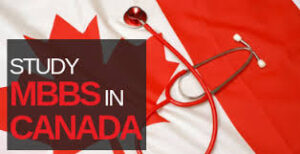 MBBS in Canada
MBBS in Canada
The Program Structure
(MBBS Degree in Canada)
Length: In Canada, a doctoral program normally lasts four years. It is composed of:
Pre-Clinical Phase: The first one to two years are devoted to studying the basic sciences of medicine, such as pathology, pharmacology, anatomy, and physiology.
Clinical Phase: The final two to three years are devoted to clinical rotations in a range of medical specialties, including pediatrics, surgery, internal medicine, and obstetrics/gynecology. Practical experience in clinics and hospitals is provided throughout this phase.
Overview:
| Degree Equivalent | MD (Doctor of Medicine) |
| Eligibility Criteria | Bachelor’s degree in Biology Sciences with minimum 60% |
| Entrance Tests Required | MCAT, IELTS, TOEFL |
| NEET | Mandatory with minimum marks |
| Course Duration | 3-4 Years |
| Medium of Teaching | English |
| Recognition | WHO and MCI/DCI |
| Duration of Residency | 3-7 Years |
Qualifications for Admission
Bachelor’s Degree: Prior to enrolling to medical school, candidates must, in Canada, have earned an undergraduate degree, in contrast to many other nations. Although not required, a solid background in the sciences is usually assumed for this degree.
MCAT: The majority of medical schools in Canada demand that candidates take the Medical College Admission Test (MCAT), a standardized test that evaluates their ability to solve problems, think critically, and understand the natural, behavioral, and social sciences.
GPA: Because Canadian medical schools are renowned for their demanding academic standards, a strong GPA is essential.
References and Personal Statement: Applicants are required to send in letters of recommendation as well as a personal statement. These records ought to emphasize the candidate’s drive, background, and fitness for a medical profession.
Interview: A lot of schools make use of the Multiple.
Top Universities in Canada for MBBS
Canada is home to several prestigious medical schools, including:
University of Toronto
McGill University
University of British Columbia (UBC)
McMaster University
University of Alberta
University of Ottawa
University of Calgary
Queen’s University
Cost of Tuition
The annual cost of tuition for Canadian citizens and permanent residents is between CAD 10,000 and CAD 25,000. Depending on the university, costs for overseas students can be much higher, often ranging from CAD 30,000 to CAD 90,000 year.
Living Expenses: Living expenses differ depending on the city, however Toronto and Vancouver have some of the highest costs. An estimated CAD 15,000 to CAD 25,000 should be set aside by students each year for living expenditures, which include housing, food, travel, and personal expenses.
Scholarships and Financial Assistance
Fewer Opportunities for International Students: There aren’t many opportunities for international students to receive financial help or scholarships. On the other hand, some colleges provide merit-based scholarships, and students can look into outside financial sources.
Government Loans and Bursaries: While they are normally not available to international students, Canadian students are eligible for government loans and bursaries.
Clinical Education and Resources
World-Class Hospitals: Canadian medical schools have partnerships with some of the world’s top hospitals, which give its students access to top-notch clinical education and a broad spectrum of medical diseases.
Research Opportunities: Students frequently get the chance to work on cutting-edge research projects while they are in school because Canada is a leader in medical research.
Read Also:
Following Graduation Routes
Residency: Following graduation with an M.D., candidates must finish a residency program in the specialty of their choice. Depending on the specialty, residency programs in Canada can run anywhere from two to seven years.
Obtaining a license to practice medicine in Canada requires graduates to pass the Medical Council of Canada Qualifying Examination (MCCQE) and finish residency.
CaRMS: Medical graduates are matched with residency programs through the fiercely competitive Canadian Resident Matching Service (CaRMS). Since the majority of residency seats are only available to Canadian citizens and permanent residents, international students must overcome additional obstacles during this procedure.

Limited Seats for International Students
There are extremely few seats available at Canadian medical schools for international students. Admission is highly difficult, with permanent residents and citizens of Canada frequently receiving preference.
Visa Requirements: In order to study and maybe work in Canada after graduation, international students must make sure they meet the necessary visa requirements.
 Obstacles
Obstacles
High Competition: There is fierce competition for admission to Canadian medical schools, particularly for students from overseas. Strong MCAT scores, a stellar academic record, and pertinent extracurricular involvement are prerequisites.
Cost: For international students who may have limited access to financial aid, the high cost of living and education can be a major obstacle.

